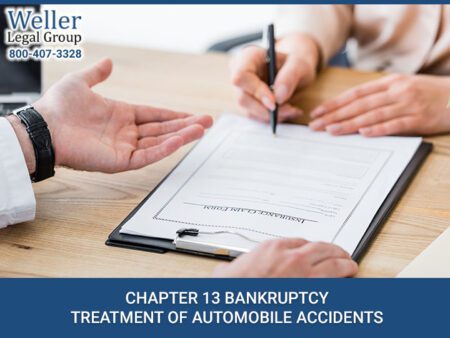 If a Debtor is in an automobile accident, either before the filing of the Chapter 13 Bankruptcy or after the filing of Chapter 13, proceeds from any personal injury or property settlement arising out of the accident, are included in the Bankruptcy Estate. In Chapter 13 Bankruptcy in which the Debtor uses the Florida Bankruptcy Exemptions, there is no Exemption that specifically protects such proceeds arising from the accident.
If a Debtor is in an automobile accident, either before the filing of the Chapter 13 Bankruptcy or after the filing of Chapter 13, proceeds from any personal injury or property settlement arising out of the accident, are included in the Bankruptcy Estate. In Chapter 13 Bankruptcy in which the Debtor uses the Florida Bankruptcy Exemptions, there is no Exemption that specifically protects such proceeds arising from the accident.
Most of our clients in Chapter 13 Bankruptcy, who are involved in an automobile accident, suffer such an accident after the filing of the Chapter 13 Bankruptcy. In such an instance, certain documents need to be filed in the Bankruptcy Court. First, the personal injury attorney should file a Motion to Employ Professional. The Bankruptcy Judge, after receiving the Motion, will generally sign an Order Approving Application To Employ, meaning the Personal Injury Attorney is formerly employed by the Debtor in the Bankruptcy Court to continue his representation of the Debtor in the personal injury matter. Because many Personal Injury Attorneys are unfamiliar with the procedures of the Bankruptcy Court, often this and other necessary documents are prepared and filed by the Bankruptcy Attorney. The Bankruptcy Attorney may charge the Personal Injury Attorney a fee for his or her attorney fees incurred pursuant to the costs incurred in the preparation of the necessary documents, filing of documents, and other time incurred in assisting the Personal Injury Attorney. However, the Personal Injury Attorney may file such necessary documents and motions himself or herself.
While the personal injury matter is continuing, often the injured party will be in need of medical treatment. The medical providers, including doctors and chiropractors, will generally be issued letters of protection by the Personal Injury Attorney. Such letters of protection mean that once the case is settled or finished, the personal injury attorney will distribute any monies received in such settlement or judgment to the appropriate medical providers, his own fees, and any remaining monies to the Debtor.
When the case is settled or rendered in the final judgment, it is imperative that a Motion To Approve Settlement be filed. This Motion is formally referred to in the Bankruptcy Court in Tampa as a Motion To Approve Compromise Of Controversy. This Motion will be accompanied by a Settlement Sheet or Settlement Agreement detailing how all monies are to be distributed pursuant to the Settlement or Final Judgement. The personal injury attorney will generally be awarded his or her attorney fees, without reduction, as the Bankruptcy Court recognizes the significant effort demanded in such actions.
The Bankruptcy Court will conduct a hearing on the Motion to Approve Compromise Of Controversy, at which the Judge will review the Settlement or Final Judgment and then issue an appropriate Order to Approve Settlement. This Order is formally referred to as an Order Granting Motion To Approve Compromise Of Controversy.
IT IS IMPERATIVE THAT NO MONIES SHALL BE DISTRIBUTED WITHOUT THE BANKRUPTCY COURT FIRST ISSUING THE ORDER TO APPROVE SETTLEMENT OR ORDER APPROVING COMPROMISE OF CONTROVERSY. IF THE PERSONAL INJURY ATTORNEY DISTRIBUTES ANY MONIES ABSENT AN ORDER FROM THE BANKRUPTCY JUDGE, THE PERSONAL INJURY ATTORNEY MAY BE LIABLE FOR SUCH MONIES IMPROPERLY DISTRIBUTED.
The information that is needed by the Bankruptcy Attorney should such an accident occur is:
- WHEN DID THE ACCIDENT OCCUR?
- WHAT IS THE NATURE OF THE PHYSICAL INJURIES?
- WHAT IS THE NAME OF THE PERSONAL INJURY ATTORNEY?
- WHAT IS THE ADDRESS OF THE PERSONAL INJURY ATTORNEY?
- WHAT IS THE PHONE NUMBER OF THE PERSONAL INJURY ATTORNEY?
- WHAT IS THE EMAIL OF THE PERSONAL INJURY ATTORNEY?
- WILL THERE BE A SEPARATE PROPERTY SETTLEMENT?
This information must be provided to the office of the Bankruptcy Attorney within ten (10) days from the date of the accident. If such a personal injury attorney is not enlisted within such period, then such information must be immediately provided upon the retention of such attorney.
The Bankruptcy Attorney will negotiate with the Chapter 13 Bankruptcy Trustee’s Office in an attempt to retain as much of the monies received by the Debtor in the personal injury action as possible. Any monies paid to the Bankruptcy Trustee will be used towards the payment of certain creditors including the Chapter 13 Plan. How many monies are distributed varies depending upon the classes of creditors included in such a Plan?
In certain circumstances in which special or extraordinary circumstances exist, the Bankruptcy Attorney may make an application to the Bankruptcy Court for the Debtor to retain some or even all of such proceeds. Special or Extraordinary Circumstances can include ongoing and necessary medical expenses, especially those relating to the accident. Special Circumstances may also include necessary expenses such as significant repairs to the Homestead. Despite such efforts, there is no guarantee that such monies will inevitably be retained by the Debtor.
What follows are the sample forms required by the Bankruptcy Court:
APPLICATION TO EMPLOY PROFESSIONAL
ORDER APPROVING APPLICATION TO EMPLOY
MOTION TO APPROVE COMPROMISE OF CONTROVERSY
ORDER GRANTING MOTION TO APPROVE COMPROMISE OF CONTROVERSY
Other Information that the bankruptcy attorney, the personal injury attorney, and the Debtor in the Chapter 13 Bankruptcy should be familiar with is also attached:
MOTION TO APPROVE COMPROMISE OR SETTLEMENT AGREEMENT
EXPENSE REIMBURSEMENT GUIDELINES
Picture Credit: VistaCreate

